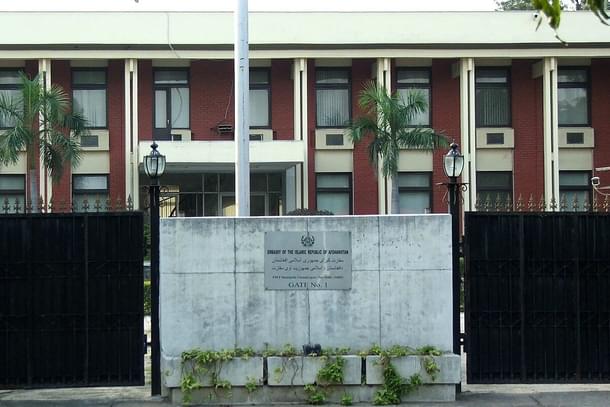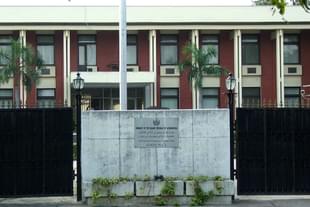News Brief
India's Conundrum: Accepting Or Rejecting The Taliban's Diplomatic Shuffle At Afghan Embassy In Delhi
Swarajya News Staff
May 15, 2023, 02:08 PM | Updated 02:07 PM IST
Save & read from anywhere!
Bookmark stories for easy access on any device or the Swarajya app.


The recall of Afghan Ambassador to India Farid Mamundzay by the Taliban and the appointment of Trade Counsellor Qadir Shah as Charge D' Affaires (Acting Ambassador) has presented a complex situation for India's foreign policy on Afghanistan situation and its engagement with the Taliban.
Afghan media published a letter on Sunday (14 May) from Afghans in India, accusing the current Ambassador and other officials of corruption.
Ambassador Mamundzay, who has been serving in India since 2020 and is currently in Delhi, responded with a letter that criticises the allegations as “one-sided, biased and untruthful”.
He attributed the difficulties faced by Afghans abroad to the "collapse of the democratic system" in Afghanistan.
Earlier last month, Taliban Ministry of Foreign Affairs' Human Resources Director issued an order date 25 April, recalling Ambassador Farid Mamundzay to Kabul and asking him to report to the MFA in Kabul.
On the same date, in a separate order, Amir Khan Muttaqi, Taliban Foreign Minister declared that Trade Counsellor Qadir Shah has been assigned the responsibility to oversee the work at the Afghanistan Embassy in Delhi, India, and to report to the Kabul government.
This move seems to be in line with Taliban's action in China earlier this year when the Ambassador resigned, and a senior diplomat from the same embassy was appointed to the position by the Taliban.
Qadir Shah has made it clear that he has no affiliations with any "political party, group, or movement", reports The Hindu.
According to Shah, the Afghan Ministry of Foreign Affairs in Kabul wished to appoint someone to address issues related to complaints against embassy officials regarding corruption and non-performance of their official duties.
Shah identifies himself as a diplomat representing the pre-Taliban "Islamic Republic of Afghanistan" and an official of the Afghanistan Ministry of Foreign Affairs.
This development showcases the Taliban's strategy of appointing individuals they deem suitable to important positions and maintaining a tight grip on Afghan embassies overseas.
MEA officials have reportedly not received formal notice of the Taliban decision to change the envoy, and view it as an "internal" matter for the Embassy.
However, there are concerns over how India would react if a Taliban-approved dispensation at the Afghan Embassy in New Delhi were to act against Afghans in India who are under threat from the Taliban regime in Kabul or if they were to raise the Taliban flag at the Embassy, as they did at Afghan Embassies in Moscow and Beijing.
Embassies in Pakistan, Uzbekistan and Iran also now have Taliban-approved diplomats at the helm, while many of Afghanistan’s former 60-odd embassies are facing a closure due to Ambassadors' refusal to pledge loyalty to Taliban, which is leading to dwindling funds.
India, similar to many other countries, does not acknowledge the Taliban government. However, last year, the Indian government established a "technical mission" in Kabul. Further, the officials from the Ministry of External Affairs (MEA) have met with Taliban ministers, and the Taliban officials have been trained in online courses in MEA projects.
However, in India, the MEA continues to collaborate with Ambassador Mamundzay for consular and trade issues.
If India accepts the Taliban's wish to replace the Afghan Ambassador, it could indicate a formalisation of its ties with the insurgent group.
In the past, India has accused the Taliban of terror attacks, including the 2008 bombing of the Indian Embassy in Kabul, in which an Indian diplomat and two ITBP personnel were killed.





